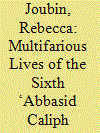|
|
|
Sort Order |
|
|
|
Items / Page
|
|
|
|
|
|
|
| Srl | Item |
| 1 |
ID:
175799


|
|
|
|
|
| Summary/Abstract |
A vast array of narratives found in medieval historical chronicles and literary sources have referenced the particular ways in which the culture associated with the ‘Abbasid caliphate diverged from a binary model of gender. Despite debate about the historical accuracy of these early chronicles, the repeated references to the sixth ‘Abbasid caliph Muhammad al-Amin's non-heteronormativity indicate at least a kernel of truth. This article examines the collective memory construction of al-Amin in the Egyptian series Harun al-Rashid (1997) and two Syrian series, Abna’ al-Rashid: al-Amin wa-l-Ma'mun (The Sons of al-Rashid: al-Amin and al-Ma'mun, 2006) and Harun al-Rashid (2018). These contemporary portrayals of the life of al-Amin simultaneously illustrate the process by which history is altered by authorial perspective and the erasure of nonheteronormative space within the ‘Abbasid caliphate. My own authorial perspective inclines toward an interpretation of al-Amin as queer; through this lens, an inspection of wide-ranging accounts of al-Amin's life reveals the historical biases of his time and our current moment, too, as historians then and now variably recognize al-Amin's queerness in constructing collective memory. Some have argued that anti–al-Amin chroniclers may have engaged in historical revisionism and referred to al-Amin as queer to discredit the caliph, but ultimately, whether or not this is true, the current application of those early references by contemporary screenwriters is the most revealing historiographical decision, as his many representations serve as a mirror for our contemporary subjectivities, interests, and agendas. At a time when queer lives and experiences are notably absent from traditional historical narratives, this article proposes that regardless of the accuracy of the original sources, the absence itself in contemporary portrayals is significant, as patterns of exclusion yield tangible meaning. In this particular case, the ready elimination of queerness from contemporary narratives shows the ways in which queerness is vulnerable to erasure in favor of other, more politically expedient identity characteristics and values.
|
|
|
|
|
|
|
|
|
|
|
|
|
|
|
|
| 2 |
ID:
127509


|
|
|
|
|
| Publication |
2014.
|
| Summary/Abstract |
This article examines sketches from the Syrian television show Buq'at Daw' (Spotlight). Once considered indicative of changes many hoped for during the early days of the Bashar al-Asad regime, Buq'at Daw' remained popular through the reform process's failure and the beginning of the recent Syrian uprising. While scholars have cast critical programming as an "airing" of public frustrations permitted by the regime in order to stave off popular protest, this article argues that focusing on government intent robs intellectuals of agency. Instead, this article looks at productions like Buq'at Daw' as part of a continual attempt by drama creators to challenge limits of what is permissible through innuendo, stratagem, and word artistry.
|
|
|
|
|
|
|
|
|
|
|
|
|
|
|
|
|
|
|
|
|